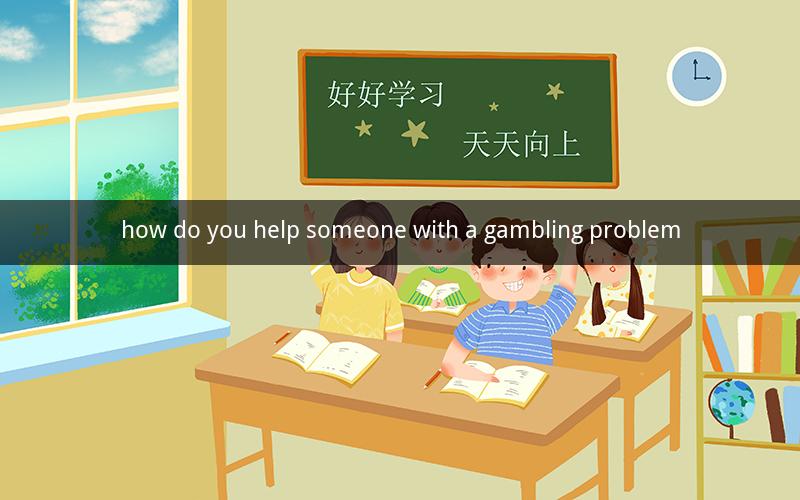
Table of Contents
1. Understanding Gambling Addiction
2. Identifying a Gambling Problem
3. Communicating with the Gambler
4. Encouraging Professional Help
5. Setting Boundaries and Support Systems
6. Financial and Legal Consequences
7. Coping with Relapse
8. The Role of Family and Friends
9. Resources for Support
10. Conclusion
1. Understanding Gambling Addiction
Gambling addiction, also known as problem gambling, is a serious condition that affects individuals, families, and communities. It is characterized by an inability to control gambling behavior, leading to negative consequences in various aspects of life. Understanding the nature of gambling addiction is crucial in providing effective support to someone struggling with this issue.
1. Identifying a Gambling Problem
Recognizing the signs of a gambling problem is the first step in helping someone. Common signs include secretive behavior, financial difficulties, neglect of responsibilities, and an increasing need to gamble to achieve the same level of excitement. Paying attention to these signs can help in early intervention and support.
1. Communicating with the Gambler
Open and honest communication is essential in helping someone with a gambling problem. It is important to approach the conversation with empathy and without judgment. Encourage the individual to share their feelings and experiences, and listen actively without interrupting. Avoid confrontational language and focus on expressing concern for their well-being.
1. Encouraging Professional Help
Seeking professional help is crucial in treating gambling addiction. Encourage the individual to consult with a therapist or counselor specializing in addiction. Therapy can provide personalized strategies for managing gambling behavior and addressing underlying issues contributing to the addiction.
1. Setting Boundaries and Support Systems
Establishing boundaries and support systems can help in managing the individual's gambling behavior. Encourage them to limit their access to gambling opportunities, such as avoiding casinos or online gambling sites. Encourage them to surround themselves with supportive individuals who can provide emotional and practical assistance.
1. Financial and Legal Consequences
Gambling addiction can lead to significant financial and legal consequences. It is important to address these issues and help the individual seek appropriate legal advice if necessary. Encourage them to seek financial counseling to develop a plan for managing debts and preventing future financial problems.
1. Coping with Relapse
Relapse is a common challenge in overcoming gambling addiction. Help the individual develop coping strategies to manage cravings and triggers. Encourage them to maintain a strong support system and seek professional help if they experience a relapse.
1. The Role of Family and Friends
Family and friends play a crucial role in supporting someone with a gambling problem. Encourage them to educate themselves about gambling addiction and provide emotional support to the individual. Encourage them to participate in support groups for family members of individuals with gambling addiction.
1. Resources for Support
There are numerous resources available to support individuals with gambling addiction. Encourage the individual to explore these resources, including hotlines, support groups, and online forums. These resources can provide valuable information, guidance, and emotional support.
1. Conclusion
Helping someone with a gambling problem requires understanding, empathy, and a commitment to supporting their recovery journey. By providing a supportive environment, encouraging professional help, and addressing the various challenges associated with gambling addiction, you can make a significant difference in the life of someone struggling with this issue.
Questions and Answers
1. Q: How can I identify if someone has a gambling problem?
A: Look for signs such as secretive behavior, financial difficulties, neglect of responsibilities, and an increasing need to gamble to achieve the same level of excitement.
2. Q: What is the role of therapy in treating gambling addiction?
A: Therapy can provide personalized strategies for managing gambling behavior, addressing underlying issues contributing to the addiction, and developing coping skills.
3. Q: How can I help someone with a gambling problem set boundaries?
A: Encourage them to limit their access to gambling opportunities, such as avoiding casinos or online gambling sites, and surround themselves with supportive individuals.
4. Q: Can family and friends participate in support groups for individuals with gambling addiction?
A: Yes, family and friends can participate in support groups for family members of individuals with gambling addiction to receive emotional support and guidance.
5. Q: What are some coping strategies for managing cravings and triggers?
A: Coping strategies may include engaging in healthy activities, seeking support from friends and family, and practicing relaxation techniques.
6. Q: How can I help someone with a gambling problem address financial and legal consequences?
A: Encourage them to seek financial counseling to develop a plan for managing debts and prevent future financial problems. They may also benefit from legal advice if necessary.
7. Q: Are there any resources available to support individuals with gambling addiction?
A: Yes, there are numerous resources available, including hotlines, support groups, and online forums that provide valuable information, guidance, and emotional support.
8. Q: How can I provide emotional support to someone with a gambling problem?
A: Offer empathy, listen actively without judgment, and encourage them to seek professional help. Be patient and understanding throughout their recovery journey.
9. Q: Can gambling addiction be completely cured?
A: While complete recovery is possible, gambling addiction is often a chronic condition that requires ongoing management and support.
10. Q: How can I help someone with a gambling problem prevent relapse?
A: Encourage them to maintain a strong support system, seek professional help if they experience a relapse, and develop coping strategies to manage cravings and triggers.